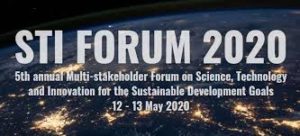CANCELLED: 2020 | 5th annual Multi-stakeholder Forum on Science, Technology and Innovation for the Sustainable Development Goals (STI Forum)
EVENT CANCELLED
(originally scheduled New York, New York, USA)
2020 May 12 – 13
In light of the global COVID-19 pandemic, the Economic and Social Council has decided to defer the STI Forum to 2021.
The 5th STI Forum will be held from 12 to 13 May 2020 in New York. The Co-chairs of the 2020 Forum, appointed by the President of ECOSOC Her Excellency Mona Juul, are the Permanent Representatives of Ghana (Ms. Martha Pobee) and Israel (Mr. Danny Danon) to the United Nations.
The Forum will provide inputs for the High-Level Political Forum on Sustainable Development ((HLPF) to be held from 7-16 July 2020. The theme of the 2020 HLPF has been decided as “Accelerated action and transformative pathways: realizing the decade of action and delivery for sustainable development.” IEEE Entrepreneurship’s focus is to foster entrepreneurial engineering, technological, & sustainable innovation for the benefit of humanity. This connects the HLPF to the political declaration of the 2019 SDG Summit, which called for a decade of action to deliver the SDGs by 2030.
As in previous years, the theme of the 2020 STI forum will be ‘ Using science, technology and innovation for accelerating action and transformative pathways’, aligning the theme of the HLPF. Further, current discussions around the structure of the 2020 HLPF are converging towards a model that draws from the Global Sustainable Development Report (GSDR) 2019, in particular, its discussion of “entry points” and “levers” for action to capitalize the interlinkages across goals and targets.

The GSDR presented four levers of change (governance, economy and finance, individual and collective action, and science and technology) which can catalyze change across multiple SDGs by working through in six entry points: strengthening human well-being and capabilities; shifting towards sustainable and just economies; building sustainable food systems and healthy nutrition patterns; achieving energy decarbonization and universal access to energy; promoting sustainable urban and peri-urban development; and securing the global environmental commons.
These entry points also indicate key areas for STI action in support of the achievement of the entire range of SDGs, in particular through addressing trade-offs, realizing synergies and accelerating progress towards the overarching objective of ‘leaving no one behind’.


